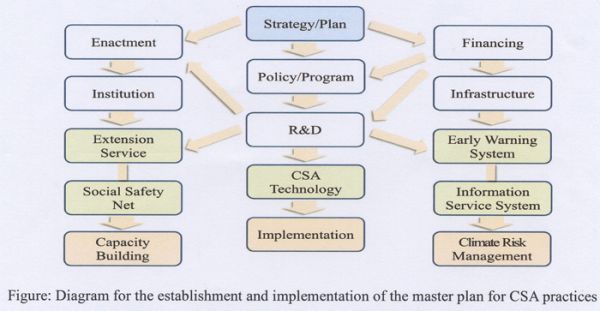Kee-Kyung Kang
Agro-Ecosystem Laboratory, National Academy of Agricultural Science, Rural Development Administration, Republic of Korea
E-mail: kkkang@korea.kr
In response to changing climate and its adverse effects, the government of the Republic of Korea (ROK) has enacted the "Basic Law on Low Carbon and Green Growth" in 2010 to provide a broad framework in establishing policies for sustainable national development. Since then, the concerned ministries have formulated strategic and action plans to enhance adaptive capacity to climate change in various levels, as well as to pursue economic growth and environment protection. For the agricultural sector, the ROK Ministry of Agriculture, Food and Rural Affairs, in cooperation with the Rural Development Administration, has prepared and released a comprehensive "master plan to cope with climate change in the agricultural sector (2011-2020)” in 2011. This master plan with its ancillary activities for climate-smart agriculture (CSA) was drawn up (see figure) based on evaluations and analysis of issues related to field crop production, vegetable production, livestock production, aquaculture, fishery, forestry, water resource management, post-harvest handling, and marketing in major production regions. The three major goals of this plan by 2020 are: 1) a 35% reduction in greenhouse gas emissions; 2) an 6% increase of carbon sequestration; and 3) stable production and supply of agricultural commodities. To achieve these goals and to make the plan tangible for and amenable to the stakeholders, the following R&D areas are emphasized:
-
Continuing impact assessments of climate change on food production systems such as crop and animal productivity, soil erosion, land availability, etc. in short-term and long term aspects;
-
Construction of monitoring and risk management systems in the agro-ecosystem;
-
Development of policy options and improvement of institutions to cope with climate change;
-
Development of innovative technologies and measures to cope with climate change;
-
Enforcement of infrastructures to cope with climate change;
-
Development of new breeds that are resistant/tolerant to diseases and natural disasters;
-
Capacity building to enhance adaptive capability and to forecast food supply and demand under changing climate situations;
-
Development of early warning system for climate disasters and weather forecasting system for farming;
-
Development of low carbon agro-product certification;
-
Establishment of collaborative networks
References
KACCC. 2010. National Strategic Plan for Climate Change Adaptation (2011-2015). The Korean Adaptation Centre for Climate Change. (In Korean).
MAFFF. 2011. The detailed implementation plan to cope with climate change in the agricultural sector. The Ministry of Agriculture, Food, Fishery and Forestry. (In Korean).

|
Submitted paper for the FFTC-TARI International Workshop on Stragetic Approach to Integrate Practical Technologies for Climate-Smart Crop Production, Aug. 12-16, 2013, Taiwan, ROC |


Master Plan for Sustainable Agricultural Production in the Face of Climate Change in Korea
Kee-Kyung Kang
Agro-Ecosystem Laboratory, National Academy of Agricultural Science, Rural Development Administration, Republic of Korea
E-mail: kkkang@korea.kr
In response to changing climate and its adverse effects, the government of the Republic of Korea (ROK) has enacted the "Basic Law on Low Carbon and Green Growth" in 2010 to provide a broad framework in establishing policies for sustainable national development. Since then, the concerned ministries have formulated strategic and action plans to enhance adaptive capacity to climate change in various levels, as well as to pursue economic growth and environment protection. For the agricultural sector, the ROK Ministry of Agriculture, Food and Rural Affairs, in cooperation with the Rural Development Administration, has prepared and released a comprehensive "master plan to cope with climate change in the agricultural sector (2011-2020)” in 2011. This master plan with its ancillary activities for climate-smart agriculture (CSA) was drawn up (see figure) based on evaluations and analysis of issues related to field crop production, vegetable production, livestock production, aquaculture, fishery, forestry, water resource management, post-harvest handling, and marketing in major production regions. The three major goals of this plan by 2020 are: 1) a 35% reduction in greenhouse gas emissions; 2) an 6% increase of carbon sequestration; and 3) stable production and supply of agricultural commodities. To achieve these goals and to make the plan tangible for and amenable to the stakeholders, the following R&D areas are emphasized:
References
KACCC. 2010. National Strategic Plan for Climate Change Adaptation (2011-2015). The Korean Adaptation Centre for Climate Change. (In Korean).
MAFFF. 2011. The detailed implementation plan to cope with climate change in the agricultural sector. The Ministry of Agriculture, Food, Fishery and Forestry. (In Korean).